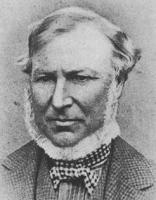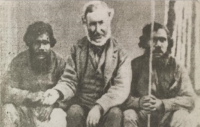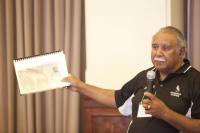During the 19th century in Victoria, the southernmost mainland Australian state, Scotsman Angus McMillan took part in murdering hundreds of Gunaikurnai indigenous tribespeople. Now Russell Broadbent, a Victorian member of the federal parliament for the conservative government, is urging that McMillan's name be taken from the Victorian federal seat of McMillan. Gunaikurnai Lands and Waters Aboriginal Corporation Acting CEO Ricky Mullet says there is a great need to support the removal of the name McMillan from the land where many of the Gunaikurnai people were massacred. The story has been picked up by The Wire, a current affairs reporting service offered to about 400 volunteer community radio stations across Australia.
It heard from Ghillar Michael Anderson, Aboriginal rights activist and leader of the Euahlayi people of north-western New South Wales, that there are many places across Australia similarly named after mass murderers. His own ancestors were murdered nine miles north of what is now the small outback town of Brewarrina, where he was born and raised. Hear The Wire’s conversation with Ghillar by clicking here.
A scholar of Aboriginal studies is developing a website, “Australian Frontier Conflicts (1788-1940s)”, documenting known massacres. The author writes there: “The information provided on this site is aimed at pointing those interested in Australia’s frontier conflict history to resources for further study and research. It is particularly aimed at senior high school and tertiary students and anyone interested in Australian history from 1770.
“Resources on this website focus on conflicts, beginning with the permanent arrival of the British in 1788 to set up the colony of New South Wales, until the 1940s. Resources include such material as a bibliography, a chronology of some of the known conflicts between colonists and the First Peoples, conflicts by States and Territories, and an all-important expanding map of some known conflict sites across today’s Australia.” Getting the map to open is still causing technical problems.
Ghillar explains that the Australian public doesn’t know this history because conservative governments have banned teaching of it in schools.
“They wiped history from the main school curriculum because they don’t want the public to know what has happened in this country and what they did to Aboriginal people,” he says in the report.
“I think we have an Australian society that would surely condemn the actions that were done at that time and understand where the Aborigines are coming from in their arguments for justice. I think the Australian people are a fair-minded people and they operate on that credo of fair go for everybody.”
Ghillar suggests that the move to rename the electorate of McMillan will send “a bit of a shock wave to many people, because if we can establish and prove that places, streets, bridges and harbour locations, were named after people who participated in mass murder, I think the public would agree that we can’t have that.”
“What upsets me is people saying ‘aw, that was done way back then’. We’re like the Jewish people, who had atrocities perpetrated against them, we’re saying we’re never going to let you go. We can’t forget, because they’re our families that were massacred.”




More Aboriginal news
Indigenous voices missing amid claims a university is 'whitewashing' history - 'Australia’s least trusted newspaper may have just broken the record for ‘world’s oldest scoop’ - Of course Australia was invaded – massacres happened there less than 90 years ago - Why Australia lies to itself about its indigenous history - Transnational genocide in Canberra presentation - Former Australian prime minister Tony Abbott wrote this week: 'Unlike France or Britain, we lack a colonial past to complicate the present' - It beggars belief
Western Australian parliament inquiry into Aboriginal suicides
Western Australian parliament announces inquiry into Aboriginal youth suicide rate
The West Australian parliament will hold an inquiry into the number of Aboriginal youth suicides in the state after a 10-year-old Kimberley girl took her own life. A public outcry followed the news of the child's death last month, prompting calls for a royal commission and the announcement of a state coroner's inquest into several suspected suicides in the Pilbara and Kimberley regions.
Momentum building for a Royal Commission in Aboriginal and Torres Strait Islander suicides
A political firestorm followed the tragic loss of a 10-year-old girl to suicide and one inquiry after another is being called but according to those in the suicide prevention space, only a royal commission can make a difference.
Why a royal commission into the high rate of suicide must happen – and soon
A royal commission into Aboriginal and Torres Strait Islander suicides is the only way forward to radically reducing the suicide crisis at least to parity with non-Aboriginal suicide rates.
Self determination will reduce the suicides
Self-determination is a protective factor against suicide; so why rescind that from us?'
End the toxic silences, pack up the myth and conspiracy of shame and taboo
Suicide is an increasing toll for all Australians. For Aboriginal and Torres Strait Islanders it is a catastrophic humanitarian crisis.
Parliamentary Inquiry to examine Aboriginal youth suicide in WA
"The Parliamentary committee will examine:
* The status of previous inquiry recommendations related to Aboriginal youth suicide in remote areas
* The allocation of resources to current suicide prevention strategies and services
* Ways to address gaps, including broader mental health strategies and services"
Previous coverage here on linksunten
227 proposals to address family violence
After a 13-month inquiry a Royal Commission into family violence in Victoria, Australia’s southernmost mainland state, makes 227 recommendations in its report to parliament. Family violence is the biggest killer in Australian society for women aged between 15 and 44.
The inquiry’s brief was to investigate how to effectively prevent family violence, improve early intervention, support victims, make perpetrators accountable, better coordinate community and government responses, evaluate and measure strategies, frameworks, policies, programmes and services.
‘Many of those who contributed to our work have been directly or indirectly affected by family violence and we thank them for their courage and insight,’ said Commissioner Marcia Neave.
The report includes an important focus on the disproportionate impact of family violence on Aboriginal and Torres Strait Islander women and children, notes a Change the Record movement.
“We commend the Royal Commission for highlighting the experiences of Aboriginal and Torres Strait Islander women and children, whose voices have too often been silenced in policy discussions. The Royal Commission’s Report signals a new era for tackling family violence and its recommendations for a holistic and whole-of-community response should be considered by all levels of government.”
"We feel very encouraged by the report that Aboriginal women are front and centre in the report because Aboriginal women are too often silenced," commented Antoinette Braybrook, CEO of the Aboriginal Family Violence Prevention and Legal Service Victoria in a report by the National Indigenous Television Service (NITV), which highlighted nine of the recommendations specifically targeting indigenous communities.
“This is a watershed moment. We strongly welcome the Royal Commission recommendations that the Victorian government needs to invest in Aboriginal community controlled organisations, such as FVPLS Victoria, who support victims/survivors of family violence. Aboriginal women must have access to culturally safe services for their safety - it is imperative that our services are funded to meet need.”
During its 13 months of sitting, the commission heard that indigenous communities are far more likely to experience family violence, but far less likely to report it. The commission heard that much of this silence stemmed from a fear of authorities that these communities still harbour. The inquiry heard that if you're an Indigenous woman, you're 25 times more likely than a non-indigenous one to be killed or injured because of domestic abuse.
Excerpts from submissions made to the inquiry:
Our clients live with intergenerational trauma, removal of children, discrimination, poverty, mental health issues, family violence-driven housing instability and homelessness, disability, lower levels of literacy and numeracy, as well as a range of other cultural, legal and nonlegal issues.
Gender inequality underpins the phenomenon of male violence against women and a focus on achieving gender equality is essential for preventing family violence.
There are significant issues of trust between Aboriginal people, the police and government services. Whether it’s a lack of follow up shown when reporting an instance of family violence, or a heavy handed response from a government agency when a family seeks help, Aboriginal people find they are either facing a lack of support in the most serious of cases, but excessive interventions in other situations.
The Aboriginal definition of the nature and forms of family violence are broader and more encompassing than those used in the mainstream. Family violence service providers and the broader family violence sector need to have an understanding and be more inclusive of the Aboriginal definition to ensure the delivery of culturally safe and respectful services to all those in the Victorian Aboriginal community.
One of the primary reasons given for choosing to not use an Indigenous service was explained in the context of the interconnectedness of our families and communities confidentiality cannot be assured when using Indigenous services and this can compromise the safety of victims.
Providing young people with an understanding of family violence and a range of strategies and personal skills to ensure they do not perpetrate family violence is a key element of family violence prevention in the community. Effective implementation of family violence prevention strategies with young people can ensure family violence is not played out inter-generationally.
Training frontline workers in best practices, early intervention and preventative action, risk management, as well as in a tertiary setting is vital. Undergraduate teaching in social sciences, allied health professions, medicine, legal, and policing must give greater emphasis to social and behavioural problem solving, trauma from sexual abuse, family violence, and the issues associated with colonisation.
We work in a very holistic supportive way empowering women and children to grow and accept that they have rights. Encouraging them that they are very worthwhile and can survive after the violence has ended, we are culturally appropriate with children’s programs, women’s groups as well as guest speakers and Elders who come in and talk.
Accommodation options for men who are required to leave the family home due to their family violence actions are limited. Currently many of the options are hotels or boarding homes as crisis accommodation each one of these accommodation setting comes with its own risk to the client and those around them whilst the man is going through his crisis. VACSAL recommends allocated access of transitional housing stock as crisis accommodation beds both during and after hours so that the Aboriginal time out programs can be resourced with housing stock to provide “time out” and not just case management support. The creation of greater access to transitional housing stock provides men with meaningful time out whilst the family can be maintained and supported in their family home.